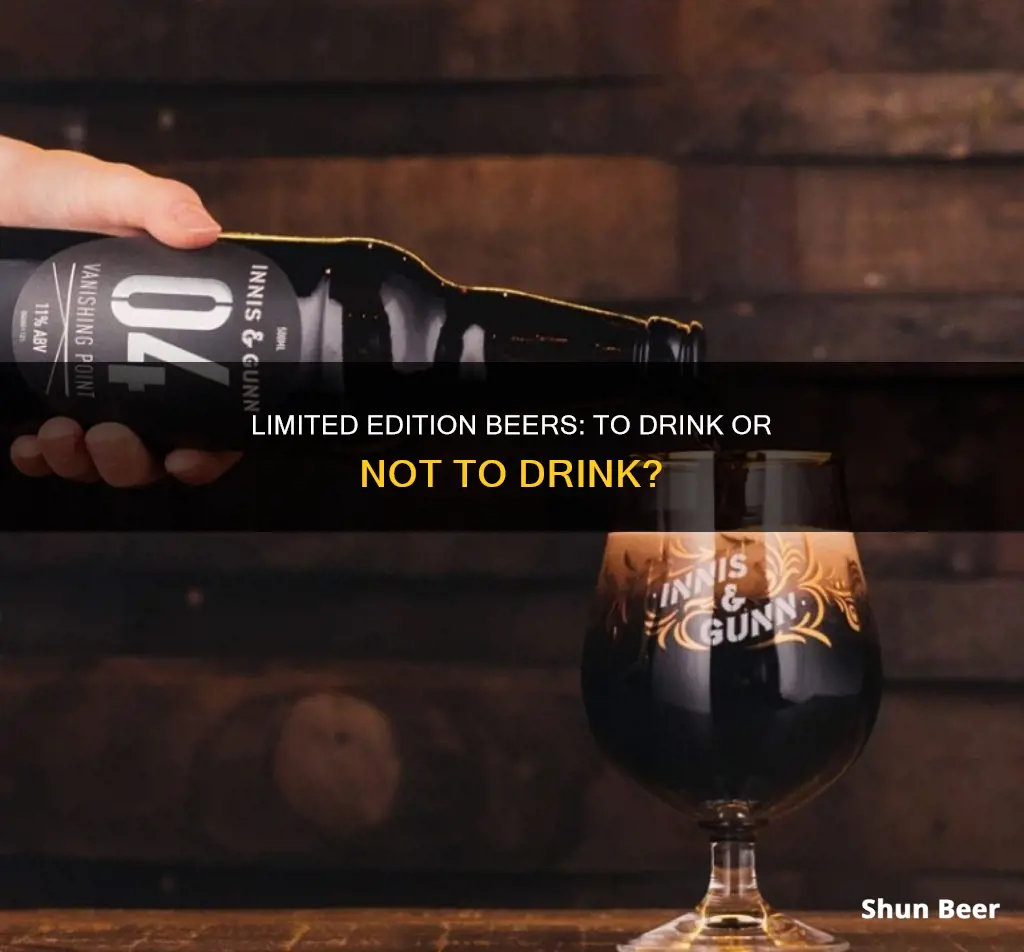
Limited-edition beers are often marketed as such to create a sense of exclusivity and urgency for consumers. While some limited-edition beers may be collectible and increase in value over time, the majority are likely seasonal or marketing hype. For example, Samuel Adams' Utopias beer, a limited-edition release with a high alcohol content of 28%, is only brewed in small batches every two years, making it hard to come by and expensive. On the other hand, some limited-edition beers, like Innis & Gunn's Vintage beer, are crafted to be savoured and enjoyed, with a rich, evolving flavour that matures over time. Ultimately, the decision to drink or collect limited-edition beers depends on personal preference and the specific beer in question.
| Characteristics | Values |
|---|---|
| Collectible | Maybe, if the bottle and packaging are unique |
| Increase in value over time | Unlikely |
| Taste | Evolves over time |
| Production | Only available in small batches |
| Price | More expensive than regular beer |
What You'll Learn

Limited edition beers: collectible or marketing hype?
Limited-edition beers are often marketed as exclusive, rare, and crafted with unique ingredients or processes. But does that make them collectibles worth saving, or are they simply a marketing ploy? Let's explore the nature of limited-edition beers and whether they are worth the hype.
The Appeal of Limited-Edition Beers
Limited-edition beers hold a certain allure for beer enthusiasts. They are typically produced in small batches, with limited availability, creating a sense of exclusivity. Beer lovers may be enticed by the opportunity to taste something unique and different from the regular offerings. Additionally, these beers often showcase innovative brewing techniques, experimental ingredients, or collaborations with renowned brewers, further enhancing their appeal.
Collectibility and Aging Potential
One question that arises with limited-edition beers is whether they are collectibles that will increase in value over time. While some beers, such as vintage ales and certain bottle-conditioned beers, can improve with age, it is important to understand that most beers are not meant for long-term aging. The aging process can be unpredictable, and factors such as improper storage or a broken seal can lead to spoilage.
In terms of collectibility, it is worth noting that the value of limited-edition beers may not increase significantly over time. While some rare and sought-after releases could potentially gain value, the majority of limited-edition beers are not likely to become highly prized collectibles. The collectibility of a beer often depends on factors such as scarcity, reputation, and the brewer's track record.
Marketing Hype or Legitimate Offering?
The "Limited Edition" label can indeed be a marketing strategy to create a sense of urgency and exclusivity. However, it is not always an indicator of quality or rarity. Some breweries may use this label to promote seasonal beers or special releases without necessarily offering a truly unique or limited product. As one beer enthusiast commented, a truly special beer does not need the "Limited Edition" label to generate interest and sales.
So, Should You Drink or Save Them?
Ultimately, the decision to drink or save limited-edition beers depends on personal preference. If you are intrigued by the unique characteristics of a particular beer and want to experience its flavor, drinking it while it is fresh and at its peak condition is advisable. On the other hand, if you are a collector or enjoy the idea of savoring a rare beer, you may choose to hold onto a limited-edition bottle for a special occasion or to compare its flavor evolution over time.
In conclusion, limited-edition beers can be an exciting opportunity to explore new flavors and brewing innovations. While they may not always live up to the hype, they offer a chance for beer enthusiasts to indulge in something different and potentially discover a new favorite. Whether you choose to drink or save them, limited-edition beers can provide a unique and memorable tasting experience.
Beer Drinking: How Long Before Bed is Safe?
You may want to see also

Limited edition beers and their alcohol content
Limited-edition beers are often seasonal and are typically marketed with creative and eye-catching packaging. While some believe that limited-edition beers are a marketing gimmick, others consider them collectibles that may increase in value over time. However, the appreciation of these beers is subjective, and there is no guarantee that they will become more valuable.
The alcohol content of limited-edition beers can vary significantly. Some limited-edition beers have a relatively standard alcohol content, such as the Goetze's Candy Co. and Guinness collaboration, which resulted in a 4.5% ABV cream ale. In contrast, other limited-edition beers have exceptionally high alcohol content, such as the Samuel Adams Utopias, which contains 28% ABV and is illegal to sell in 15 US states.
The alcohol content of beer is measured by the percentage of alcohol by volume (ABV). The ABV of beer typically ranges from 3.5% to 3.8% for American beers and around 5% for regular beer. However, some beers have a much higher ABV, such as the Scottish beer Brewmeister Snake Venom, which has an ABV of 67.5%, making it the strongest beer in the world.
The higher the ABV, the faster the drinker will become intoxicated. Additionally, the fermentation process and the amount of fermentable sugar available to the yeast influence the alcohol content of the beer. Limited-edition beers may use unique ingredients or production methods that differ from standard beers, potentially resulting in a higher ABV.
In summary, limited-edition beers can vary in their alcohol content, from standard levels to exceptionally high percentages. The appreciation of these beers as collectibles is subjective, and there is no guarantee of increasing value over time. The high ABV of some limited-edition beers may provide a stronger effect, but it is essential to drink responsibly and comply with local laws regarding alcohol consumption and sales.
Beer Distributors: The Logistics of Getting Beer to Customers
You may want to see also

The taste of limited edition beers
Limited-edition beers are often marketed as exclusive, must-have products with price tags to match. These beers are typically crafted in small batches with unique or rare ingredients, resulting in higher production costs. While some view these beers as a gimmick to drive profits, others appreciate the opportunity to savour a carefully crafted beer with exceptional flavours.
The taste of limited-edition beers can vary significantly, as brewers often experiment with different ingredients, ageing processes, and brewing techniques. For example, Innis & Gunn's Vintage limited-edition beer is matured in first-fill American Bourbon casks for 100 days and then further matured in a bottle for six years, resulting in a rich, decadent flavour that evolves with every sip. Similarly, Samuel Adams' Utopias beer is an extreme barrel-aged brew with a blend of several malt varieties and German Noble hops, resulting in a deep, rich malty smoothness reminiscent of vintage port, cognac, or fine sherry.
BrewDog, another popular brewer of limited-edition beers, offers a range of carefully crafted IPAs, stouts, and non-alcoholic options with exceptional flavours. Their limited releases are known for their robust and creamy coffee notes, crisp and refreshing lagers, and unique flavour combinations.
Limited-edition beers can also be seasonal offerings, such as Samuel Adams' fall favourite, OctoberFest, and its Jack-O Pumpkin Ale. These beers provide a fun and festive drinking experience, often with creative packaging and unique flavours that reflect the season or occasion.
While some limited-edition beers may be priced higher due to their small-batch nature and experimental ingredients, it's important to consider the overall value and drinking experience they offer. These beers provide an opportunity to explore diverse flavours and innovative brewing techniques, savouring each sip as you enjoy a carefully crafted beverage that may not come around again.
Old Beer, New Problems: Drinking Day-Old Beer Safely
You may want to see also

Limited edition beers: seasonal or special occasions?
Limited-edition beers are often seasonal or made for special events and occasions. They are typically marketed as such to create a sense of exclusivity and urgency for consumers. These beers are usually only available in small batches and for a limited time, encouraging beer enthusiasts to seek them out and savour each drop.
Seasonal limited-edition beers are often released during specific times of the year, such as autumn or winter, and may feature unique flavours or ingredients associated with those seasons. For example, Samuel Adams is known for its seasonal flavours like the ever-popular OctoberFest and Jack-O Pumpkin Ale, released during the autumn months. These beers capture the essence of the season and provide a sense of novelty and festivity for consumers.
Special occasion limited-edition beers, on the other hand, might commemorate a specific event, anniversary, or collaboration. For instance, a brewery might release a limited-edition beer to celebrate its 10th anniversary or partner with a local distillery to create a unique, small-batch beer. These beers often have distinct characteristics, such as ageing in special casks or incorporating unique ingredients, setting them apart from regular offerings.
Innis & Gunn's Vintage beer is an example of a limited-edition beer crafted after six years of meticulous ageing. Only 1,000 bottles of this rich and decadent brew were made available, each matured in first-fill American Bourbon casks and then further bottle-aged for six years. Such limited-edition releases create a sense of exclusivity and intrigue, attracting beer aficionados eager to experience something extraordinary.
While limited-edition beers may not necessarily increase in monetary value over time, they do offer a unique drinking experience that evolves with ageing. Similar to ageing wine, limited-edition beers can develop complex flavours and characteristics as they mature, providing a dynamic tasting journey for those who savour them at different intervals. However, like fine wines, these beers can also reach a point where ageing diminishes their quality, so it's essential to enjoy them within an optimal timeframe.
Beer and Mucinex: Safe Mix or Health Risk?
You may want to see also

Limited edition beers: small batches and rarity
Limited-edition beers are often released in small batches and are marketed as rare. This can be a marketing tactic to create a sense of exclusivity and urgency for consumers. While some limited-edition beers may be collectible, it is unlikely that they will increase significantly in value over time. However, some beers, such as the Samuel Adams Utopias brand, are sought-after by collectors due to their high alcohol content and unique brewing process. This particular limited-edition beer is released biennially and is illegal to sell in 15 states due to its high alcohol content.
Small-batch beers are often crafted with unique ingredients and experimental brewing techniques, pushing the boundaries of traditional brewing. For example, Innis & Gunn's Vintage limited-edition beer is matured in first-fill American Bourbon casks for 100 days and then bottle-aged for an additional six years, making it their longest-matured beer to date. Such limited-edition beers offer a unique tasting experience that may evolve with time, similar to aging wine.
The rarity of small-batch, limited-edition beers also encourages consumers to savour and appreciate every drop, as they know their supply is limited. This sense of exclusivity and scarcity can enhance the drinking experience and create a sense of excitement and anticipation among beer enthusiasts.
While some may choose to collect and age limited-edition beers, it is important to remember that beer, unlike wine, may not age well over extended periods. The aging process can be unpredictable, and the beer may reach a point where it begins to spoil rather than improve. Therefore, it is generally recommended to consume limited-edition beers while they are still within their intended drinking window to fully appreciate the brewer's intended flavours and aromas.
In conclusion, limited-edition beers offer a unique opportunity to explore the art of brewing and experience innovative flavours. While some may be tempted to collect and age these rare beers, it is essential to consider the potential for spoilage and enjoy them while they are at their peak. The exclusivity and small-batch nature of these beers create a sense of excitement and urgency, encouraging beer enthusiasts to savour every drop.
Beer and GERD: What You Need to Know
You may want to see also
Frequently asked questions
Limited-edition beers are those that are only available in small batches and for a limited time. They are often crafted with unique ingredients and methods, pushing the boundaries of brewing.
Limited-edition beers can be worth the money if you appreciate rare and unique craft beers. They may offer a rich and decadent flavour profile that evolves with every sip. However, they might not appreciate in value over time.
Not necessarily. Limited-edition beers can vary in alcohol content, with some being stronger than average and others falling within the standard range. For example, the limited-edition Samuel Adams Utopias beer has 28% alcohol by volume, while a regular beer typically has 5%.
It depends on your preference. Some people choose to drink limited-edition beers right away to enjoy them while they're fresh. Others may decide to cellar them for a while, as the flavours can evolve and become more complex over time, similar to ageing wine. But be cautious, as beers can also turn bad after a certain point.
Limited-edition beers are typically available directly from the brewery or through specialised online retailers. They may also be found at select liquor stores or bars, but due to their limited nature, they might be challenging to come by.







